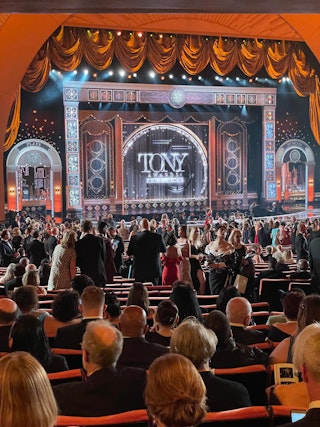History of the Tony Awards
The Tony Awards, also known as the Antoinette Perry Award for Excellence in Broadway Theatre, are named for Antoinette ‘Tony’ Perry, who was an actress, director, producer, and leading figure in the New York theatre industry. Perry was a cofounder of the American Theatre Wing, a nonprofit established by suffragettes in 1917 dedicated to supporting theatre. Following Perry’s death in 1946, the Wing decided to hold an awards ceremony in her honor which would celebrate outstanding achievement in theatre.
The first Tony Awards were held in 1947 in the Grand Ballroom of the Waldorf Astoria hotel in New York City. Award winners received inscribed money clips (for the men) and Tiffany’s compacts (for the women). The ceremony was an enormous success and has been held annually ever since, with the exception of the 2020 awards which were postponed to 2021 due to the COVID-19 pandemic. The event’s popularity quickly outgrew hotel ballrooms. Since 1947 the Tonys have taken place in Broadway theatres, and various venues around the city including the Beacon Theatre on the Upper West Side, and Radio City Music Hall. The 2024 ceremony took place at the Lincoln Center’s David H. Koch Theater.
The Tonys were first televised in 1957 for a local New York station. In 1967, the Broadway League joined the Wing as co-producers of the Tonys, and this was the first year the ceremony was broadcast nationally on network television. For the first time, audiences across America could watch the Tony Awards, and the broadcast quickly gained a large audience. As many as 20 million people tuned in to watch the 1974 Tony Awards. Viewership of the Tonys has declined since its early years, with audiences of around six to eight million people watching pre-pandemic, to 2024’s audience of around 3.5 million viewers. Today you can catch the Tonys on CBS (which has broadcast the show since 1978) or stream the event on Paramount+.
How the Tony Awards Work
Who decides which shows receive Tony Award nominations? And who chooses the winners?
The Tony Awards Administration Committee determines the eligibility of shows for Tony nominations. The committee is comprised of 24 industry professionals who are affiliated with the American Theatre Wing, The Broadway League, the Dramatists Guild, Actors’ Equity Association, United Scenic Artists, and the Stage Directors and Choreographers Society. The members are publicly listed on the Tony Awards website.
The Administration Committee appoints approximately 50 theatre professionals to be members of the Nominating Committee. The Nominating Committee is responsible for selecting the nominees for each award category. Its members see every eligible Broadway show each season, then vote to determine the official nominees. Nominating Committee members serve a three-year term and are also publicly listed.
Once the nominations are confirmed, they are voted on by a much larger sector of theatre industry professionals. According to the Tony Awards website, there are approximately 831 eligible voters. The number changes slightly each year and is made up of designated members from The Broadway League, the American Theatre Wing, the Dramatists Guild, Actors’ Equity Association, United Scenic Artists, the Stage Directors and Choreographers Society, and the Association of Theatrical Press Agents and Managers. Other eligible voters include members of the Theatrical Council of the Casting Society of America, the New York Drama Critics' Circle, the board of the National Association of Talent Representatives, and the Tony Awards Nominating Committee.
Every voter must attend all eligible shows. If a voter fails to attend a production, they are barred from voting on that production in any category. All balloting is done in secret and handled by an accounting firm. Strict precautions are taken to ensure no one associated with the theatre industry knows who the winners will be until they’re announced during the ceremony in June.
Economic and Cultural Significance
Broadway is an enormous industry for New York City. The 2018-2019 season had an attendance of 14.77 million people, and the 2023-2024 season is already up to around 85-88% of the pre-pandemic numbers. The Broadway League has predicted attendance should reach 100% by 2025 or 2026. Broadway contributes $14.7 billion to the city’s economy and supports 96,000 local jobs. The Tony Awards are a major pillar for Broadway, generating publicity, pride, and excitement for the industry.
The Tonys are an integral part of the theatre landscape not only in New York but across America and internationally. The Tony Awards are a globally respected institution, and shows that are nominated for, and especially those that win Tonys are more likely to be programmed at regional theatres and abroad. While it does happen that popular shows are commercially successful without winning a Tony, and shows that are awarded Tonys never attract a large audience, the Tonys are generally understood as a valuable key to success on Broadway and beyond. Similarly, a Tony may catapult the careers of individual winners.
While winning a Tony is an enormous achievement, there are those who note the drawbacks of an industry so guided by the awards system which, like all awards systems, is not entirely unbiased. There are many deserving shows and talented theatremakers which may be overlooked, or struggle to succeed without the aid of awards that are influenced by many factors (social, political, and economic) and not purely merit.
Like the Oscars and the Emmys, the Tonys also have an important cultural impact. These are the shows most likely to be seen by people who are not regular theatregoers but may only see one or two shows per year, as well as people who live outside of New York. The stories the winning shows are telling, and the artists who tell them, are the ones shaping the cultural conversation. Tony Award landmarks, like the first Black playwright to win the award for Best Play (August Wilson for Fences in 1987), or the first women to win in the Best Direction categories (Julie Taymor for The Lion King and Garry Hynes for The Beauty Queen of Leenane, both in 1998), have a real social impact. In 2021, Jeremy O. Harris’s Slave Play won a record-breaking 12 Tony nominations, which was groundbreaking for the representation of Black and queer playwrights.

Highlights from the 77th Annual Tony Awards in 2024:
Stereophonic won the Tony for Best Play and received 13 nominations, breaking the record for a play previously held by Slave Play.
The Outsiders won the Tony for Best Musical, while Suffs’ Shania Taub won the Tonys for Best Book of a Musical and Best Original Score.
The Alicia Keys jukebox musical Hell’s Kitchen received 13 nominations.
Maleah Joi Moon (Hell’s Kitchen) and Jonathan Groff (Merrily We Roll Along) won Best Actress and Best Actor in a Musical respectively.
Sarah Paulson (Appropriate) and Jeremy Strong (An Enemy of the People) won Best Actress and Best Actor in a Play respectively.
Kecia Lewis (Hell’s Kitchen) and Daniel Radcliffe (Merrily We Roll Along) won Best Featured Actress and Best Featured Actor in a Musical respectively.
Danya Taymore won Best Direction of a Musical for The Outsiders.
Nikiya Mathis received a Special Tony Award for her hair and wig design work for Jaja’s African Hair Braiding. She has called out the industry for its lack of hair designers who know how to work with actors of color, and believes hair design should be a permanent Tony category.
Dede Ayite won Best Costume Design of a Play for Jaja’s African Hair Braiding.
Linda Cho won Best Costume Design of a Musical for The Great Gatsby.
Tom Scutt won Best Scenic Design of a Musical for Cabaret at the Kit Kat Club.
David Zinn won Best Scenic Design of a Play for Stereophonic.
Folk duo Jamestown Revival (Zach Chance and Jonathan Clay) and Justin Levine were nominated for Best Original Score and Best Orchestrations for The Outsiders.
Ariana DeBose hosted the Tonys for the third year in a row.
The shows with the most nominations and awards:
Hell’s Kitchen (13 nominations, 2 awards)
Stereophonic (13 nominations, 5 awards)
The Outsiders (12 nominations, 4 awards)
Cabaret at the Kit Kat Club (9 nominations, 1 award)
Appropriate (8 nominations, 3 awards)
Merrily We Roll Along (7 nominations, 4 awards)
Water for Elephants (7 nominations, no awards)
Suffs (6 nominations, 2 awards)
Purlie Victorious (6 nominations, 1 award)
The Tony Awards have had an incredible journey. From the first ceremony at the Waldorf Hotel in 1947 to the 77th at the Lincoln Center in 2024, the Tonys have been a guiding force for the world’s theatre landscape. Although the system is not without flaws, the ceremony provides a vital platform for theatre to be celebrated across the country and across the world. With concerns of decreasing audiences in the modern era, the role the Tonys play in publicizing Broadway is important now more than ever.
Quick FAQs
June 8, 2025
Radio City Music Hall in New York City
CBS and Paramount+
White Cherry Entertainment
